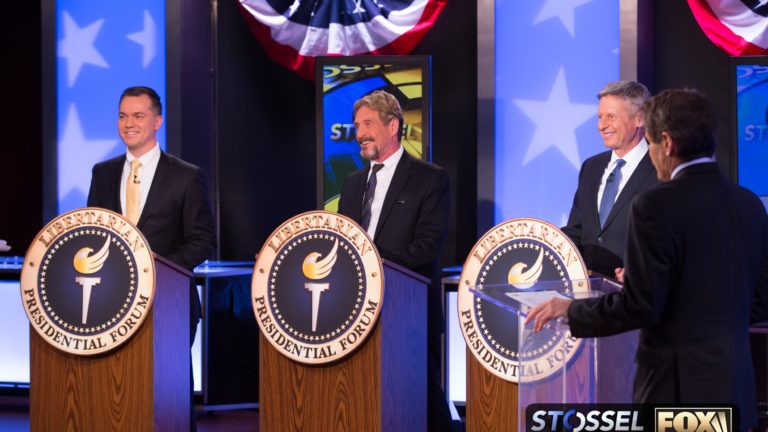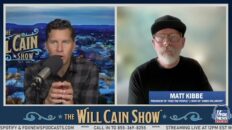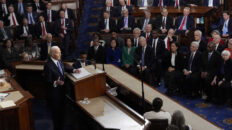Hooray for John Stossel!
He has dedicated two issues of his wonderful show on Fox Business to hosting a debate between Libertarian Party aspirants to the presidency. The format is great. The questions in part one were solid.
John does an excellent job. And the candidates were fascinating to watch. Within the LP itself, this really is a contest this year. It’s probable that Gary Johnson will get the nomination. He is the current favorite. But it could fall to John McAfee or even Austin Petersen.
Already, the Libertarian Party has garnered more public attention at this point in the cycle than ever. It makes sense too. The standard bearers of the two dominant parties present a choice between socialism and fascism, between forced nationalism or forced internationalism, between the establishment and something that could even be worse than the establishment, between two flavors of intensified despotism.
And this is happening even as the failures of the old model of a state-managed society are more obvious than ever. Never before in modern history have the two mainstream candidates had such high unfavorables in the polls. Generally, two thirds of Americans judge Trump and/or Clinton to be intolerable.
Therefore, and surprisingly, it falls to the Libertarian Party. Maybe this will be the breakout year. Yes, we hear this every election cycle but maybe it is true this time. Maybe hundreds of thousands of new people, and perhaps millions, will get interested and make it their choice. There could be huge educational benefits too.
Stossel is really doing these guys a favor by letting them get a taste of what it is like to be on a national stage, speaking to regular people. He is giving each a dress rehearsal for what could come next.
Which candidate will best represent?
But We Don’t Want a Ruler
I watched part one of the debate in a room full of dedicated activists. For each of us, it’s a weird sensation to actually see our little marginal movement and party on national television. Being treated seriously! In a conventional debate format! This is the first time anything like this has ever happened.
That’s not the only strange part. We are trying to figure out which one of these guys deserve our support, but they are running to be the head of the world’s most powerful and well-funded government. This is exactly the opposite of what we want. We want a world without power, without leaders of this sort. And yet to get there, one path might be to elect someone who similarly opposes power to hold power.
Or perhaps we are realistic and understand that the Libertarian Party candidate cannot and will not win. This is not because the party is bad or unpopular or because of media discrimination. It’s because the whole political system is set up for two parties only. The system is winner-take-all, not parliamentary. The election laws and the logic of choice determine that outcome. What’s more, the political system is effectively owned by the Republicans and Democrats.
But is it right to run for president knowing full well that you cannot win? And by not winning are you sending the signal that libertarianism as an ideology is a loser? Of course this problem has always afflicted the LP. It’s why Murray Rothbard was initially opposed to its very existence. Eventually, however, he came around to believe that Americans are disinclined to care much about political philosophy at all apart from real politics. The libertarians, he concluded, probably need to run a candidate or risk permanent marginalization in American life.
Rothbard fought hard to forge an LP that stated the most radical-possible positions, if only to serve as a wake-up call. The party’s platform was a treatise of particulars, including immediate drug legalization and open borders. That has long-since changed, however, as the LP came to embrace a role of being a real election vehicle for the aspirations of anyone who wants a freer life.
Gary Johnson
By all accounts, Gary was a very good governor of New Mexico from 1995 to 2003. He governed the way we imagine a libertarian should, vetoing bad legislation, cutting taxes, increasing social freedom. He was the choice of the LP in 2012 and did a fine job on the campaign trail. I’ve met him and found him to be a true gentleman. He is very likeable.
If you believe the goal of the LP is to run viable candidates who could actually take the reins of power and do some good for the country, even cutting the budget and reducing regulatory control, he is your man.
On the Stossel debate, however, he seemed more interested in talking about his family and his triumphs in outdoor sports than explaining his views on liberty and why it matters. Indeed, I had the impression that he lacked passion for the enterprise of actually running for president. His whole demeanor was just a bit too chill.
If he gets the nomination — and even in order to secure the nomination at all — he is going to have to step up his game. He needs to focus on a few issues that he thinks are important, get better at using social media, and tighten up his presentation generally.
He has faced a great deal of criticism for saying, in response to John’s question, that he favors laws against religious discrimination. Austin got in his best line of the night by asking whether a Jewish baker should be forced to bake a cake for Nazis.
In fairness, Gary actually gave a decent counterexample of why he would retain religious anti-discrimination law. If you have a community with a public utility that was permitted to discriminate, he said he could imagine, given the present political environment, that localities could actually shut off power to Muslim communities. He wants to retain a legal basis for keeping such service provision mandatory. His point seemed less directly against voluntary discrimination than against the hysteria generated by the Trump campaign.
You can agree or disagree, but he doesn’t stand in violation of libertarian principle here.
John McAfee
Here again, I’ve met John and he is a very interesting and brilliant person with fascinating ideas. He would surely gain attention for the party. True, he is not even slightly “presidential” and fits no definition of “electable” that I’ve ever heard. But maybe that is a good thing. If you believe that the purpose of the LP is to enlighten, shock, and disrupt — and forget all this blather about governing — he is your man.
He clearly has an anarchist spirit that I appreciate. However, in the debate he let his passion for technology actually distract himself from the principle of freedom. At one point he claimed that we are in a cyberwar with China for stealing technology — a claim that might work as an applause line at a Trump rally but doesn’t fit with a peace platform.
And for a vagabond and rebel — a man with no regard for law or establishments — he came across as too attached to existing entitlement programs and existing foreign policy commitments. For a person who has the persona of a revolutionary, he was disappointingly conventional when it came to the details.
Apart from that, his defense of free association in commercial life was exactly right.
The biggest advantage he has going into the convention fight for the nomination is that he is a famous personality and rich by any standard. Libertarians are flattered by his attentions. But nominating him could be risky because anything he says — and he is capable of saying just about anything — will be seen as a libertarian perspective. I’m not convinced his ideological instincts are well-trained enough to bear that responsibility.
Austin Petersen
Austin is an old friend of mine, so I’ll be cautious in criticizing him though we have big differences in perspectives on a wide range of issues. That said, I like him and appreciate his energy and entrepreneurship in getting the liberty message out there.
When he first announced, however, most people thought he was just trolling the LP and not even slightly serious. This impression has persisted for months. It’s probably time to let that dismissive attitude go. Austin’s candidacy is for real, even if his demeanor often suggests otherwise.
After this debate, a widely held view was that Austin seemed phony and canned, like a person pretending to run for president, almost mocking the persona of a politician the way Colbert once satirized an uber-patriotic pundit. He spoke in prepared sound bites. The determination in his voice and his emotional bromides seemed like put ons.
It’s almost like he has watched the Republican and Democratic debates and decided: “Oh this is how politicians sound when they run for office. They’re the experts, so I’ll just mimic them as closely as possible.”
In reality, Austin does have a very likeable and warm personality. He is fun, smart, and charming. His entire campaign could be enlivened by just embracing his real self. Stop pretending to be someone you are not. Austin should let Austin be Austin.
Part of his election schtick is that he represents the younger generation working to displace a stodgy old-time party. In that case, why is he so hung up on this rhetoric about the Constitution, the founding fathers, and so on? He is young, true, but his platform sounds more like that of a 1980s conservative. Why not focus on edgier topics like technology, borderless communication, and the obsolescence of your grandfather’s government?
All that said, he is currently being underrated for all the great attention he is bringing to the Libertarian Party. His use of social media has been masterful. Not a day goes by when I don’t received some well-prepared and interesting email from the campaign. Even when I try not to be interested in opening it, I do it anyway. And I usually read every word.
Even if he doesn’t win, he will have done the party a great service.
The Best Part
Vast numbers of voters are repulsed by the two front runners for the mainstream parties right now. They rightly fear their abuses of power, their judgment, and their scary agendas.
If you are against these two would-be despots, the LP is worth a second look. Vast numbers may find themselves alarmed by various libertarian positions on all the things that government should not do. This will be seriously challenge many people. It will require voters to come to terms with fundamental issues.
The candidate we need is the one who can best build support for the simple idea of human liberty among people who vote but can’t possibly stomach the choices they are being presented by the political system this year. Which one of them does that best? That’s the standard.














Don’t vote for anyone!
Carl Watner recently republished and distributed an article by Alan P. Koontz, first published in 1985 in THE VOLUNTARYIST. Your own article does not argue that people should vote for a Libertarian Party candidate, but it certainly implies that. I sincerely doubt there is a good argument for why one ought vote in the first place, excluding the standard propaganda statist make for doing so, which I don’t think you’d endorse. The Koontz article addresses Rothbard’s “slavery analogy,” and, I think, logically refutes it. Find Koontz’ article here: http://voluntaryist.com/articles/017a.html#.VwB5vkdQHuw“”
Given the acrimonious and volatile political situation that may grow out of the presidential primaries, the final results of the general election may very well prove unacceptable to a substantial number of disenchanted voters who feel they’ve been screwed by the winners, If, as I pray, many of these discontented voters decide to withhold their support for a government they hate by not paying their taxes (as opposed to taking up arms), the demise of the nation-state may be nearer than even folks at Liberty.me suspect. Then, articulate supporters of laissez faire principles will be sorely needed to make the case for voluntaryism in a stateless society. At that time, Libertarian Party politics will be an anchor and, God willing, an anachronism.
It worries me that people watching the Libertarian presidential debate may mistake these three for actual libertarians.
None of the three candidates in the debate appear to truly understand and appreciate the philosophical underpinnings of libertarianism. Where was the discussion of the non-aggression principle, the inalienability of the will, natural rights, or self-ownership?
The discussion of ‘should the government do A or B?’ ignores the fact that any action taken by a state is an act of violence and coercion. A consistent libertarian President (which is really an oxymoron, but let’s assume it happened) would do whatever he could to grind government to a halt. Fire as many people as possible, abolish as many departments and agencies as possible, spend as little as possible, pull the military out of everywhere possible, etc.
In short, anything that a libertarian president *could* do to make the state smaller or weaker he *should* do because the state fundamentally cannot act in a way which is moral or consistent with natural rights and the NAP. The candidates’ answers regarding the welfare state revealed their confusion on this issue.
No matter how much statists may protest, a state—even a minimal state—cannot do ‘good’ things because even actions which would be laudable when done by individuals become immoral aggression when they are carried out by a state funded and maintained through coercive expropriation.
The radical libertarian in the race, Darryl W. Perry, was excluded from the debate. That’s too bad, as when he DOES get to debate those other guys, he does a good job both of exposing their flaws and of dragging them more toward libertarian perspectives with his own answers.
Two out of three candidates called for war on ISIS? these are libertarians?
I agree with @thomaslknapp — but hey, there are people who watched this and perhaps a few entertained them. My grumpy old man has been watching Stossel more lately, and coming around to some solid conclusions.
I also agree with @thomaslknapp on the apalling exclusion of Darryl W. Perry. Why was the radical libertarian candidate excluded from the debate? Is it because Perry was too radical for Fox viewers? Jeffrey, why didn’t you refer to Perry’s exclusion?
I did find the debate interesting and useful. It didn’t change my ranked order of preference — I still plan to support Perry and McAfee is still in second place — but it did increase the distance, to my mind, between Perry and all the others. He keeps looking better and better compared to them.
Thanks, Jeffrey for this link to the video. I am a delegate to the Orlando convention.
If the bulk of those “disappointed when Sanders fails”; or, those “disappointed when Trump prevails,” do choose to cast a vote for the LP presidential candidate, then it becomes a Prize job to get for publicity value alone.
11% is not bad, if the prior benchmark had been 15% to be included in the Demopublican Debates 2012… . But one poll does not a public opinion make. And judges are partisan against independent voices. as LP and Green well know.
Sheeple be like “What, there’s a third choice?”